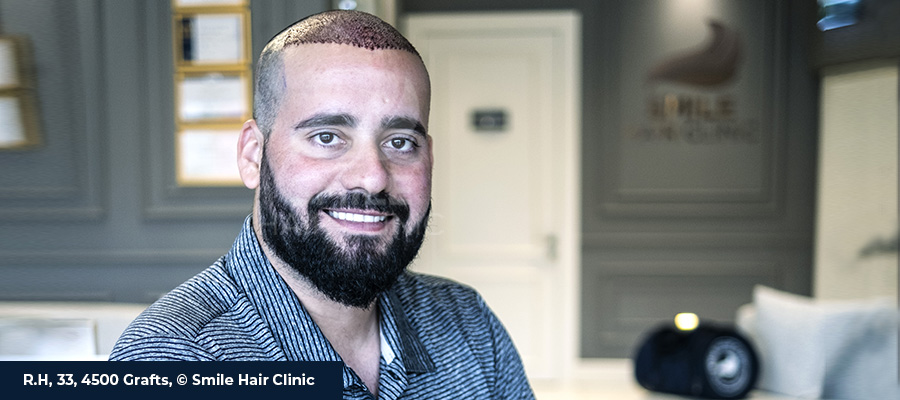After Hair Transplant

After Hair Transplant
After Hair Transplant; Stress, challenging daily life conditions, irregular sleep pattern and unhealthy eating habits, when combined with genetic factors, cause loss of hair in many people. Hair transplant is the most effective method to cope with this problem and it is also directly influencing the social life and the self-confidence.
However, one should always remember that hair transplant is a long process, which consists of three stages. These are Before Hair Transplant, Hair Transplant Surgery and after hair transplant. Hair transplant surgery accounts for fifty percent of the process; post-transplant care makes the other fifty percent.
The last stage – after hair transplant – is very important, as acting responsible and following advices of the physician have direct impacts on the success of the procedure. The patient should continue communication with the doctor after the operation and avoid any and all actions that may threat the outcome.
EARLY POSTOPERATIVE PERIOD OF HAIR TRANSPLANT
Patients are discharged to their home or hotel as soon as hair transplant procedure is completed.
Although it sounds somewhat weird, patients may suffer from loss of graft due to impacts to the head and therefore, it is necessary to act very carefully.
Doctors will prescribe medicines to prevent potential conditions and risks. It is very important to follow instructions for use of these medicines.
The bandage applied on the scalp is removed the day after the hair transplant surgery and wound care is given.
Edema and bruising are likely in face, especially around the eyes, in first couple of days after the operation; they are expected conditions and they will disappear spontaneously.
HAIR CARE AFTER HAIR TRANSPLANT
It is necessary to pay strict attention to hair care after hair transplant. Hair should not be washed in the postoperative Day 1 due to the risk of infection and easy detachment of hair follicles. Next, recommended medical shampoos should be used. Detailed information about hair wash recommendations is available on our article titled “Hair Wash After Hair Transplant”.
Doctors will advise lotions and moisturizing sprays/lotions that will be used after the hair transplant; these products should be used gently.
High-pressure and hot water should not be used to wash hair.
Hair dryers are banned for the recipient zone in the first one month.
Exposure of sun to the scalp should be avoided; in case of holiday, it is useful to use 50-SPF sunscreen.
Smoking causes adverse effects by inhibiting sufficient oxygenation of the transplanted hair.
You should not consume alcohol as long as you take medicines that are prescribed after the hair transplant surgery, as their ingredients may interact with alcohol. Moreover, it is recommended to avoid alcohol consumption for at least 15 days, as it delays the wound healing. This decision should be left to the discretion of the person.
Solarium, pool and sauna are absolutely prohibited for 1 month.
It is recommended to avoid cardiac exercises for at least 15 days, as they cause heavy perspiration and increases the risk of infection accordingly. If you do not perspire too much, non-strenuous exercises can be started 15 days later.
Patients must sleep as instructed by the doctor for 7 days after the surgery.
It is necessary to stay away from wet areas, such as sauna, solarium, pool and Turkish bath, for 1 month due to the risk of infection.
POTENTIAL COMPLICATIONS AFTER HAIR TRANSPLANT SURGERY
Hair transplant surgery is a serious operations and certain postoperative complications are likely. Some of these complications are as follows:
Swelling, bruising and edema around eyes, 42%.
Sterile folliculitis, 23%. Anxiety is unnecessary; it will disappear quickly, if you use lotion(s) or cream(s) that will be prescribed by your doctor.
Pain and itching at donor zone, 10%. It will heal dramatically thanks to a steroid cream that will be advised by your doctor.
Numbness and anesthesia in scalp, 10%.
Large scar formation at the donor zone is the most frightening complication; it is likely, if hair follicles are not harvested by experts.
Bleeding and swelling in scalp in case of an impact.
Infection that may be transmitted in the surgery or secondary to negligence of postoperative care instructions.
Postoperative side effects should be notified to the doctor and no action should be taken unless the physician is informed, who carried out the hair transplant surgery.
FIRST 6 MONTHS AFTER HAIR TRANSPLANT
First 15 days: The transplant zone will appear red in the first 15 days after the hair transplant surgery. Swelling and crust formation will occur. The first 15-day interval is similar to honeymoon; hair will grow and appear beautiful.
Third to eight weeks: The transplanted hair will shed – a phenomenon called “Shock hair loss”. Next, healthier hair will grow.
As of third month: Hair starts growing.
As of sixth month: Hair grows in a healthy manner; visible changes are recognized at this interval.
One year later: Transplanted hair grows and natural and beautiful look is obtained in most patients depending on the success of the operation. There may be changes in self-confidence and social life.

BUSINESS LIFE AND SPORTS AFTER HAIR TRANSPLANT
Strenuous activities should be avoid for the first 15 days after the hair transplant surgery. It is strongly recommended to avoid strenuous sports/exercises in the first month. This interval can be extended to 90 days for combat sports that require close contact.
Patients may usually engage in business life and daily routines can be maintained in 2 to 5 days.
VITAMINS RECOMMENDED AFTER HAIR TRANSPLANT
Health of hair originates from hair follicles. Nutrition is a very critical factor to strengthen the hair follicles. Therefore, it can be speculated that intense use of certain vitamins may contribute to the hair transplant surgery.
Vitamins E, C, A and B Complex have effects on the hair health. Vitamin B is especially recommended to be used after the hair transplant.
Patients are advised to eat foods that are rich in iron as they reinforce the immune system and accelerate the healing.
Zinc is also one of the substances that is recommended to be used after hair transplant surgery due to its potent effect on collagen tissue synthesis and hormonal homeostasis.
POSTOPERATIVE PROCESSES IN SMILE HAIR
Our physicians have performed hair transplant surgery in patients, who travel from all around the world, based on their experience and they will always manage your care also after the hair transplant surgery. You can ask all your questions over WhatsApp and you can consult us for any issue that you worry about. We will guide you in all phases of the hair transplant in your journey to the healthy hair.
 Whatsapp
Whatsapp

